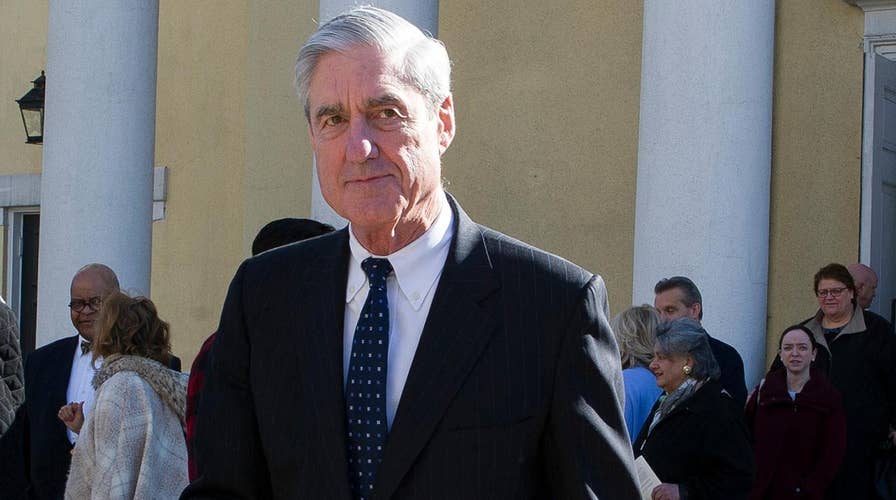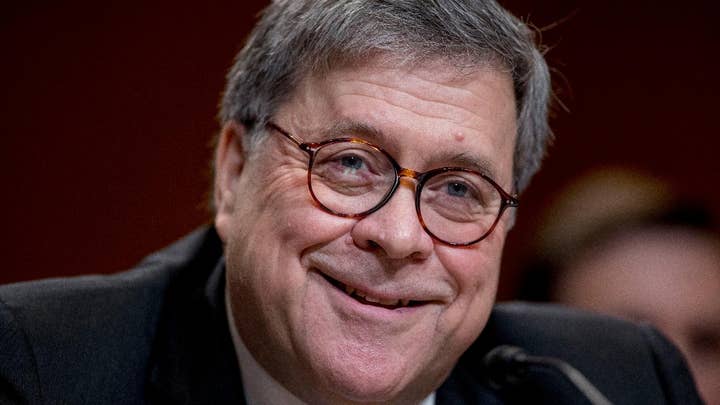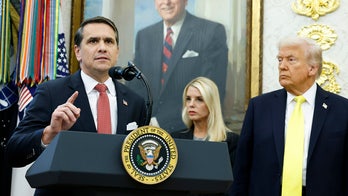Ari Fleischer: Robert Mueller owes it to the nation to weigh in on his report
Former White House press secretary and Fox News contributor Ari Fleischer says Robert Mueller is the missing voice that needs to be heard to assuage doubts about Attorney General Barr's conclusions.
Special Counsel Robert Mueller's much-anticipated Russia report is set to be released to the public and Congress on Thursday morning, the Justice Department announced.
Justice Department spokeswoman Kerri Kupec told Fox News on Monday the report would be made available -- with redactions -- Thursday morning to lawmakers and to the public. The news comes despite mounting calls from Democrats to first release the report to Congress without redactions.
Attorney General Bill Barr testified last Wednesday he planned to have the report available "within a week," maintaining his original vow to release Mueller's full report by mid-April.
Last month, Mueller submitted his more than 300-page report to the Justice Department for review by the attorney general and Deputy Attorney General Rod Rosenstein. In a letter to Congress, Barr relayed some of the primary findings of the report, stating the special counsel found no evidence of collusion between members of the Trump campaign and the Russians during the 2016 presidential election.
Mueller was also tasked with investigating whether the president had obstructed justice in any way, but, ultimately, he did not come to a conclusion on that issue, leaving the decision to the DOJ. Barr and Rosenstein, though, said the evidence was “not sufficient to establish that the President committed an obstruction-of-justice offense.”
Barr has faced mounting criticisms from Democrats over his short four-page description of findings from the Mueller’s report. Most congressional Democrats demanded Barr turn over the full report, without redactions, to the House and Senate Judiciary Committees for review, prior to releasing it to the public.
BARR HAMMERED FOR STATING 'SPYING DID OCCUR,' DESPITE CONFIRMATION OF TRUMP TEAM SURVEILLANCE
Barr, though, said he identified four areas of the report that he believed should be redacted -- including grand jury material, information the intelligence community believes would reveal intelligence sources and methods, any material that could interfere with ongoing prosecutions and information that could implicate the privacy or reputational interests of “peripheral players.”
Barr said the Justice Department, with the help of the special counsel’s office, plans to “color code the decisions from the report and provide explanatory notes describing the basis for each redaction.”
Barr maintained the DOJ is working “diligently to make as much information as possible available to Congress.”
Meanwhile, in a statement earlier this month responding to media reports, the DOJ defended Barr's rollout of Mueller's conclusions.
"Given the extraordinary public interest in the matter, the Attorney General decided to release the report's bottom-line findings and his conclusions immediately — without attempting to summarize the report — with the understanding that the report itself would be released after the redaction process," the Justice Department statement said.
The DOJ also noted every page of Mueller's report was marked to indicate it may contain grand jury material "and therefore could not immediately be released."
The president has repeatedly blasted the special counsel investigation, and again underscored the findings Monday morning that there was "no collusion" and "no obstruction." Trump, later, Monday afternoon, blasted the special counsel team and called for an investigation of the other side.
"The Mueller Report, which was written by 18 Angry Democrats who also happen to be Trump Haters (and Clinton Supporters), should have focused on the people who SPIED on my 2016 Campaign, and others who fabricated the whole Russia Hoax," Trump tweeted Monday.
"That is, never forget, the crime. Since there was no Collusion, why was there an Investigation in the first place! Answer - Dirty Cops, Dems and Crooked Hillary!" he continued.
Trump's comments come after Barr testified last week that "spying did occur" on the Trump campaign during the 2016 presidential election.
But despite the backlash from Democrats over his use of the term, Barr's testimony appeared to refer to intelligence collection that already has been widely reported and confirmed.
Foreign Intelligence Surveillance Act (FISA) warrants against former Trump campaign aide Carter Page are currently the subject of a Justice Department inspector general investigation looking at potential misconduct in the issuance of those warrants. That review also reportedly is scrutinizing the role of an FBI informant who had contacts with Trump advisers in the early stages of the Russia investigation.
A person familiar with Barr’s thinking denied that the attorney general was trying to fuel conspiracy theories or play to the conservative base.
“When he used the word spying, he means intelligence collection,” the source told Fox News last week, also noting Barr’s history as a CIA analyst in the 1970s. “He wasn’t using it in the pejorative sense, he was using it in the classic sense.”
Barr’s testimony, though, suggested he makes no distinction between the two. He also stressed that the question for him is whether that “spying” was justified.
“I want to make sure there was no unauthorized surveillance,” Barr testified.
Whether proper or improper, the issue of surveillance of the Trump campaign has been widely documented.
The FISA warrants, for example, were the subject of a GOP House Intelligence Committee memo last year. That memo alleged the unverified anti-Trump dossier provided much of the basis for law enforcement officials to repeatedly secure FISA warrants against Page, though Democrats have pushed back on parts of the GOP report.
Meanwhile, Barr announced last week that he is conducting a Justice Department review of the “conduct” of the original Russia investigation.
“[I’m] trying to get my arms around all of the aspects of the counterintelligence investigation that was conducted in the summer of 2016,” Barr said last week.
That review comes amid Justice Department Inspector General Michael Horowitz’s investigation, where he is reportedly probing the involvement of FBI informant Stefan Halper — whose role first emerged last year. During the 2016 campaign, Halper reportedly contacted several members of the Trump campaign, including Page, and former foreign policy adviser George Papadopoulos. Halper also reportedly contacted former campaign aide Sam Clovis.














































